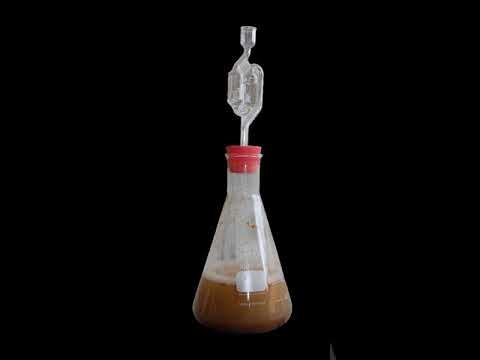Ethanol fermentation | Wikipedia audio article

# Ethanol Fermentation: A Biological Process for Energy Production
## Overview
Ethanol fermentation, also known as alcoholic fermentation, is a biological process that converts sugars such as glucose, fructose, and sucrose into cellular energy, generating ethanol and carbon dioxide as by-products. This anaerobic process is primarily carried out by yeasts and is essential for various applications, including the production of alcoholic beverages, ethanol fuel, and bread.
## Biochemical Process of Fermentation of Sucrose
The fermentation of sucrose into ethanol involves several chemical reactions. Sucrose, a dimer of glucose and fructose molecules, is initially broken down by the enzyme invertase. This step produces glucose molecules that undergo glycolysis to form pyruvate. Finally, pyruvate is converted to ethanol and carbon dioxide through a series of enzymatic reactions involving pyruvate decarboxylase and alcohol dehydrogenase.
## Related Processes
While yeasts are commonly used for ethanol fermentation, other microorganisms like Zymomonas mobilis can also convert sugars to ethanol using different pathways. Various fermentation processes, such as heterolactic acid fermentation and mixed acid fermentation, result in the production of ethanol as a by-product.
## Effect of Oxygen
Fermentation does not require oxygen, and certain yeast species only produce ethanol in anaerobic conditions. However, some yeasts, like Saccharomyces cerevisiae, prefer fermentation over respiration even in the presence of oxygen. Studies have shown that the decline in fermentative activity during batch fermentation is due to physiological changes rather than the presence of ethanol.
## Bread Baking
Ethanol fermentation plays a crucial role in bread baking by causing dough to rise. Yeast organisms consume sugars in the dough, producing ethanol and carbon dioxide that create bubbles, leading to the expansion of the dough. The ethanol content in baked bread is minimal.
## Alcoholic Beverages
The production of alcoholic beverages relies on ethanol fermentation induced by yeast. Different fruits, grains, and honey serve as sources for fermentation, resulting in various beverages like wine, cider, brandy, mead, beer, and whiskey. Distillation processes are often used to produce spirits from fermented beverages.
## Feedstocks for Fuel Production
Yeast fermentation of carbohydrates is also utilized for producing ethanol for fuel additives. Sugarcane, corn, and sugar beets are common feedstocks for ethanol production, with by-products like DDGS used as livestock feed. Sorghum, pearl millet, and even surplus wine or sugary drinks can serve as alternative feedstocks for ethanol production in different regions.
## Cassava as Ethanol Feedstock
Ethanol production can also be derived from starches like cassava, which is a cost-effective option compared to other sources. The utilization of cassava as an ethanol feedstock shows promise for sustainable energy production.
Ethanol fermentation continues to be a vital process for energy generation and various industrial applications, highlighting its significance in the biochemistry and biotechnology fields.
source
